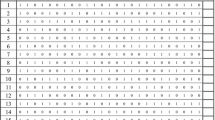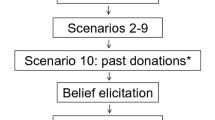Abstract
Laboratory experiments are an important methodology in economics, especially in the field of behavioral economics. However, it is still debated to what extent results from laboratory experiments are informative about behavior in field settings. One highly important question about the external validity of experiments is whether the same individuals act in experiments as they would in the field. This paper presents evidence on how individuals behave in donation experiments and how the same individuals behave in a naturally occurring decision situation on charitable giving. While we find evidence that pro-social behavior is more accentuated in the lab, the data show that pro-social behavior in experiments is correlated with behavior in the field.
Similar content being viewed by others
References
Bardsley, N. (2005). Experimental economics and the artificiality of alteration. Journal of Economic Methodology, 12(2), 239–51.
Camerer, C. (2003). Behavioral game theory. Princeton: Princeton University Press.
Camerer, C., & Fehr, E. (2005). Measuring social norms and preferences using experimental games: a guide for social scientists. In J. Henrich, R. Boyd, S. Bowles, H. Gintis, E. Fehr, & R. McElreath (Eds.), Foundations of human sociality—experimental and ethnograhic evidence from 15 small-scale societies (pp. 55–95). Oxford: Oxford University Press.
Camerer, C., & Thaler, R. H. (1995). Anomalies: ultimatums, dictators and manners. Journal of Economic Perspectives, 9(2), 209–19.
Carpenter, J., & Seki, E. (2004). Do social preferences increase productivity? Field experimental evidence from Fishermen in Toyama bay (Mimeo). Middlebury College.
Carpenter, J., Liati, A., & Vickrey, B. (2005). They come to play: supply effects in an economic experiment (Mimeo). Department of Economics, Middlebury College.
Cherry, T. L., Frykblom, P., & Shogren, J. F. (2002). Hardnose the dictator. American Economic Review, 92(4), 1218–21.
Eckel, C. C., & Grossman, P. J. (1996). Altruism and anonymous dictator games. Games and Economic Behavior, 16(2), 181–91.
Epstein, S., & O’Brien, E. J. (1985). The person-situation debate in historical and current perspective. Psychological Bulletin, 98(3), 513–37.
Frey, B. S., & Meier, S. (2004). Pro-social behavior in a natural setting. Journal of Economic Behavior and Organization, 54, 65–88.
Karlan, D. (2006). Using experimental economics to measure social capital and predict financial decisions. American Economic Review, 95(5), 1688–99.
Laury, S. K., & Taylor, L. O. (2006). Altruism spillovers: are behaviors in context-free experiments predictive of altruism towards a naturally occuring public goods (Mimeo). Georgia State University.
Levitt, S. D., & List, J. A. (2007a). What do laboratory experiments measuring social preferences reveal about the real world? Journal of Economic Perspectives, 21(2), 153–74.
Levitt, S. D., & List, J. A. (2007b). Viewpoint: on the generalizability of lab behavior to the field. Canadian Journal of Economics, 40(2), 347–370.
List, J. A. (2006). The behavioralist meets the market: measuring social preferences and reputation effects in actual transactions. Journal of Political Economy, 114(1), 1–37.
Mischel, W. (1968). Personality and assessment. New York: Wiley.
Orne, M. T. (1962). On the social psychology of the psychological experiment: with particular reference to demand characteristics and their implications. American Psychologist, 17(11), 776–83.
Ross, L., & Nisbett, R. E. (1991). The person and the situation: perspective of social psychology. New York: McGraw-Hill.
Author information
Authors and Affiliations
Corresponding author
Rights and permissions
About this article
Cite this article
Benz, M., Meier, S. Do people behave in experiments as in the field?—evidence from donations. Exper Econ 11, 268–281 (2008). https://doi.org/10.1007/s10683-007-9192-y
Published:
Issue Date:
DOI: https://doi.org/10.1007/s10683-007-9192-y




